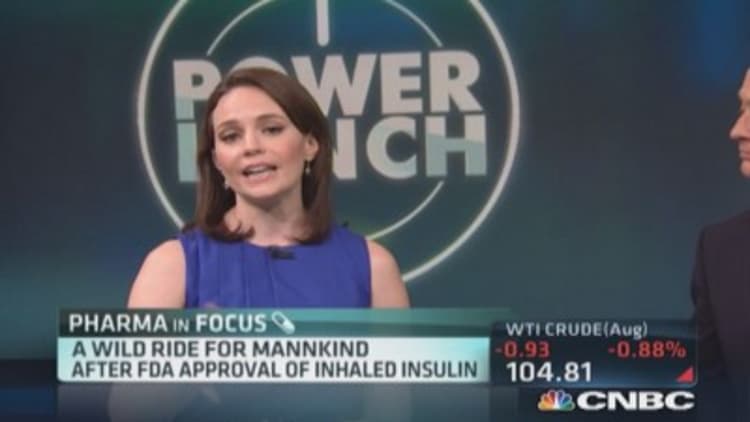A rising hedge fund star thinks that MannKind Corp. is so over-hyped that the health-care company's stock will fall 90 percent.
"Only in a frothy, retail-driven (and now Tweet-driven) market can a stock like MannKind exist with a $4.3 BILLION valuation and in our view no clear prospects of revenue," Tourbillon Capital Partners wrote in a letter to investors obtained by CNBC.com. Tourbillon manages $1.2 billion and is led by former SAC Capital Advisors portfolio manager Jason Karp.
Karp's thesis relies on his negative assessment of Afrezza, MannKind's main diabetes treatment product that was recently approved by the U.S. Food and Drug Administration. Afrezza's innovation is the ability to inhale insulin as opposed to injecting it, the most common treatment practice.
Read More

The letter notes how a similar product, Pfizer's Exubera, was a failure and Afrezza is even more likely to flop given strong negative warnings on its labels, including one about the potential for lung cancer. It also notes that Afrezza will be more expensive than standard insulin injections.
Karp added that it's unlikely for MannKind, which is manufacturing-focused, to sign a lucrative sales partnership for Afrezza.
"Based on our analysis, we believe the stock implies that MannKind can secure a royalty deal where the partner is convinced that the drug is going to do $5 billion in sales—the entire size of the short-acting insulin market," the letter said.
"While Exubera has previewed what will happen with Afrezza, the market has had a way of ignoring this drug's past failures until it actually launches," the letter added. "When and if this happens, we believe that MannKind will ultimately trade down 90% to a value around $500 million or $1/share."
Read MoreAs second half starts, what's got Cramer's eye?
Matthew Pfeffer, MannKind's chief financial officer, strongly contested Karp's thesis. In particular, he said that comparing Afrezza and Exubera wasn't fair. He noted Afrezza's much smaller physical size, saying it was about as large as a pocket-sized whistle. By comparison, he said that Exubera was the size of a tennis ball can and resembled a bong.
He also said that Afrezza is likely to be priced at around the same level as injectable insulin; Exubera was far more expensive. Pfeffer added that cancer fears were overblown and that the warning label was expected by the company and specific to certain at-risk groups.
"We think it's a much improved, next generation product," Pfeffer said.
Pfeffer was also optimistic on MannKind finding a partner to market Afrezza, a deal he hoped would be in place to launch the product late this year or early next. "We have every reason to think we will have a partner," he said.
"There's a lot of upside potential still here," Pfeffer said. "It wouldn't take much of this market to be very, very large in sales," he added.
Read MoreThe big money still loves hedge funds
Tourbillon is not the first to bet against MannKind; the company was the 15th most shorted stock as of July 10. Short interest has risen steadily over 2014.
Amy Zipper, Tourbillon's chief operating officer, declined to comment.
Karp worked at SAC's CR Intrinsic unit from 2005 to 2009, where he was a generalist portfolio manager and director of research. After a stop as co-chief investment officer of Carlson Capital, Karp launched his own long/short equity hedge fund firm in January 2013 with about $250 million under management, half of it from U.K. pension funds.
Read MoreSAC alums find success despite negative press
Tourbillon's flagship fund is up 3.94 percent so far in 2014 through June after gaining 20.69 percent in 2013. The Absolute Return U.S. Equity Index, which tracks stock-focused hedge funds, gained 4.26 percent over the same period.
The MannKind position is relatively small; the fund generally limits short positions to 5 percent or less of the portfolio, according to client materials obtained by CNBC.com. The fund also runs a so-called "low net" strategy, meaning its long market bets are relatively in balance with its shorts. The average net exposure in the second quarter was 22 percent, meaning its longs outweighed its shorts by that amount, according to the documents.
—By CNBC.com's Lawrence Delevingne






